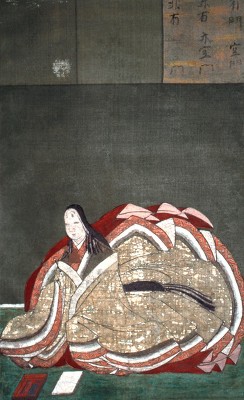“Real things in the darkness seem no realer than dreams.”
Forrás: Tale of Genji, The Tale of Genji, trans. Arthur Waley, Ch. 1: Kiritsubo
Muraszaki Sikibu japán regényíró, költő és udvarhölgy volt a Heian-korban. Legismertebb műve a Gendzsi szerelmei című nagyregény, „a világirodalom első regénye”, amely körülbelül 1000 és 1012 között keletkezhetett. A Muraszaki Sikibu felvett név, valódi neve ismeretlen, de talán ő lehetett az a Fudzsivara Takako, akit egy 1007-es udvari napló udvarhölgyként említ.
A Heian-kori nők hagyományosan nem tanulhattak kínaiul, a korabeli kormányzás nagy presztízsű hivatalos nyelvén, de a művelt apja háztartásában nevelkedő Muraszaki igen hamar fogékonyságot mutatott a kínai klasszikusok iránt, és sikerült elsajátítania a kínai írást-olvasást. Húszas évei elején-közepén ment férjhez, és egy leánygyermeke született; a férj a házasságkötés után két évvel meghalt. Nem tudni pontosan, mikor kezdte írni Muraszaki a Gendzsi szerelmeit, talán házasélete alatt, vagy nem sokkal utána. 1005-ben meghívták udvarhölgynek Sósi császárné mellé, minden bizonnyal akkor már kialakulóban levő írói hírneve miatt. Udvari szolgálata alatt is folyamatosan írhatott, udvarbéli jelenetekkel gazdagítva regényét. Öt vagy hat év után otthagyta az udvart, és Sósi császárnéval együtt visszavonult a Biva-tó mellé. Halála évét nem tudják pontosan megjelölni a kutatók: legtöbben 1014-re teszik, de vannak, akik szerint még 1025-ben is élhetett.
Három műve ismert: a Muraszaki udvarhölgy naplója, egy kötetnyi vers és a Gendzsi szerelmei. Alig egy évtizeddel elkészülte után a Gendzsit már tartományokszerte terjesztették, egy évszázad múltán pedig a japán irodalom klasszikusának számított, és tudós elemzések tárgya lett. Külföldön a 20. század első harmadában jelent meg először: Arthur Waley hatkötetes angol fordítása 1933-ra fejeződött be. Muraszaki írásai alapműveknek számítanak nemcsak irodalmi értékük okán, hanem azért is, mert részletes ábrázolást nyújtanak a virágkorát élő Heian-udvar kultúrájáról. A 13. század óta számtalan kiadásban illusztrálták őket japán festők és közismert ukijo-e mesterek.
Wikipedia

“Real things in the darkness seem no realer than dreams.”
Forrás: Tale of Genji, The Tale of Genji, trans. Arthur Waley, Ch. 1: Kiritsubo
Passim. Cf. Lacrimae rerum.
Variant translations:
The pathos of things.
A sensitivity to things.
The sorrow of human existence.
Tale of Genji
Forrás: Tale of Genji, Ch. 17: Eawase (trans. Royall Tyler)
Forrás: The Tale of Genji
“Ceaseless as the interminable voices of the bell-cricket, all night till dawn my tears flow.”
Forrás: Tale of Genji, The Tale of Genji, trans. Arthur Waley, Ch. 1
source http://no-sword.jp/blog/2010/03/iced_cream.html
The Diary of Lady Murasaki
Forrás: Tale of Genji, The Tale of Genji, trans. Arthur Waley, Ch. 29: The Royal Visit
“It is in general the unexplored that attracts us.”
Forrás: Tale of Genji, The Tale of Genji, trans. Arthur Waley, Ch. 9: Aoi
“There are as many sorts of women as there are women.”
Forrás: The Tale of Genji
trans. Richard Bowring (Penguin Books, 1996)
The Diary of Lady Murasaki
“Unforgettably horrible is the naked body. It really does not have the slightest charm.”
The Diary of Lady Murasaki
Spoken by Tō no Chūjō in Ch. 2: The Broom Tree (trans. Royall Tyler)
Tale of Genji
Forrás: Tale of Genji, The Tale of Genji, trans. Arthur Waley, Ch. 25: The Glow-Worm
Forrás: Tale of Genji, The Tale of Genji, trans. Arthur Waley, Ch. 19: A Wreath of Cloud
Forrás: Tale of Genji, The Tale of Genji, trans. Arthur Waley, Ch. 25
Forrás: Tale of Genji, The Tale of Genji, trans. Arthur Waley, Ch. 20: Asagao
Forrás: Tale of Genji, The Tale of Genji, trans. Arthur Waley, Ch. 36: Kashiwagi
Forrás: Tale of Genji, The Tale of Genji, trans. Arthur Waley, Ch. 41: Mirage
Forrás: Tale of Genji, The Tale of Genji, trans. Arthur Waley, Ch. 40: The Law
In Diaries of Court Ladies of Old Japan
The Diary of Lady Murasaki